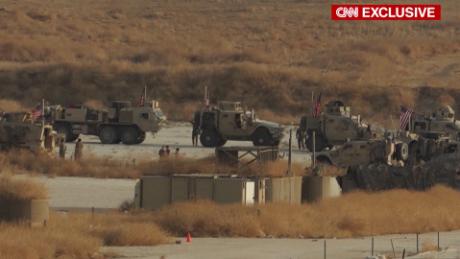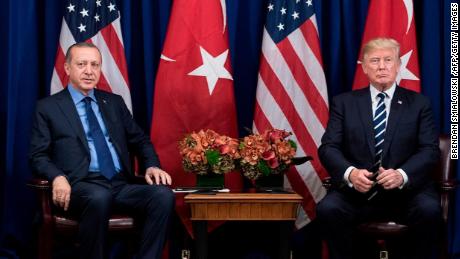No longer the obedient NATO ally, Erdogan floats nuclear option

But does Erdogan believe that Turkey has the right or need to acquire nuclear weapons to cement its status?Last month the Turkish leader suggested as much, saying that "some countries have missiles with nuclear warheads, not one or two. But we can't have them. This, I cannot accept." He went on to single out Israel, saying: "We have Israel nearby, almost as neighbors. They scare others by possessing these. No one can touch them."It was the first time Erdogan, who was speaking at a provincial rally of his governing AKP party, had raised the subject. It may have been the Turkish leader riling up his nationalist base. It may also have been a warning that, should Iran and Saudi Arabia move toward becoming nuclear-armed states, Turkey would not stand idly by. Last year, Saudi Arabia's Crown Prince Mohammed bin Salman told CBS News that the Kingdom "does not want to acquire any nuclear bomb, but without a doubt if Iran developed a nuclear bomb, we will follow suit as soon as possible."And, in part, the Turkish leader's remarks may have simply been his trademark blunt — and sometimes incendiary — rhetoric. Erdogan has compared both modern Germany and Israel with the Nazis, and has threatened to unleash hundreds of thousands of Syrian refugees on Europe.But it's a long leap from a couple of lines at a party meeting to a program to develop nuclear weapons. Turkey is developing (with Russian help) a nuclear power program, but it is a signatory to the Nuclear Non-Proliferation Treaty, and there is a whole world of difference between energy and weapons.Ziya Meral, senior associate fellow at the Royal United Services Institute (RUSI) in London, says that, at the moment, "there is no tangible sign that Turkey is set to pursue nuclear weapons, nor that we are witnessing a substantial shift in Turkey's decades-long policy of not pursuing them." "In practical terms, it would take a decade with substantial financial commitment and against substantial global pressure, both of which would make [nuclear weapons] truly costly and damaging," Meral told CNN.Meral says this appeals to religious and conservative circles as well as an influential strand of opinion that welcomes Erdogan taking a stand against what are perceived as the double standards of the West.Under Erdogan, Turkey is no longer the obedient NATO ally guarding the alliance's southern flank against Russian expansionism. Partly in response to Europe's less than wholehearted embrace, Erdogan has imagined a new place for Turkey, one where it will pick and choose its allies and project power thousands of miles from its coast.This expansionist role includes a garrison of troops in Qatar, a growing naval role in the Red Sea, support for Libya's government against the Saudi/UAE-backed forces of Khalifa Haftar and Turkey's largest overseas military base in Somalia.The sea-change in Erdogan's policy came in the wake of the Arab Spring, when he visited Cairo, Tunis and Tripoli to tout the virtues of the "Turkish model" to societies very much in flux, or even chaos: a Muslim society in a secular, free-market state. That didn't work out so well — but the civil war that erupted in Syria only deepened Erdogan's determination to project Turkish influence.US President Donald Trump's former national security adviser, General H.R. McMaster, regards this as profound, describing it as the greatest geopolitical shift in the post-Cold War era. He told an audience last month that under President Erdogan, Turkey "wants to see itself as shifting away from Europe and being more in the Middle East and more Eastern leaning so that it can play situations to its own advantage."
"In practical terms, it would take a decade with substantial financial commitment and against substantial global pressure, both of which would make [nuclear weapons] truly costly and damaging," Meral told CNN.Meral says this appeals to religious and conservative circles as well as an influential strand of opinion that welcomes Erdogan taking a stand against what are perceived as the double standards of the West.Under Erdogan, Turkey is no longer the obedient NATO ally guarding the alliance's southern flank against Russian expansionism. Partly in response to Europe's less than wholehearted embrace, Erdogan has imagined a new place for Turkey, one where it will pick and choose its allies and project power thousands of miles from its coast.This expansionist role includes a garrison of troops in Qatar, a growing naval role in the Red Sea, support for Libya's government against the Saudi/UAE-backed forces of Khalifa Haftar and Turkey's largest overseas military base in Somalia.The sea-change in Erdogan's policy came in the wake of the Arab Spring, when he visited Cairo, Tunis and Tripoli to tout the virtues of the "Turkish model" to societies very much in flux, or even chaos: a Muslim society in a secular, free-market state. That didn't work out so well — but the civil war that erupted in Syria only deepened Erdogan's determination to project Turkish influence.US President Donald Trump's former national security adviser, General H.R. McMaster, regards this as profound, describing it as the greatest geopolitical shift in the post-Cold War era. He told an audience last month that under President Erdogan, Turkey "wants to see itself as shifting away from Europe and being more in the Middle East and more Eastern leaning so that it can play situations to its own advantage." It's a view echoed by commentator Aaron Stein, who wrote in foreign policy website War on the Rocks that Erdogan: "Seemed to be using nuclear weapons as a straw man to make a broader argument about Ankara's place in the world, and how the American and Western systems with which Turkey had long associated itself are unfair and require change." "He was expounding on a more personal, deeply held grievance about Turkey's global role," Stein says.Erdogan has already taken this tack when complaining about western "financiers" undermining the Turkish economy. Last year, as the Turkish lira crumbled on international markets, hRead More – Source
It's a view echoed by commentator Aaron Stein, who wrote in foreign policy website War on the Rocks that Erdogan: "Seemed to be using nuclear weapons as a straw man to make a broader argument about Ankara's place in the world, and how the American and Western systems with which Turkey had long associated itself are unfair and require change." "He was expounding on a more personal, deeply held grievance about Turkey's global role," Stein says.Erdogan has already taken this tack when complaining about western "financiers" undermining the Turkish economy. Last year, as the Turkish lira crumbled on international markets, hRead More – Source




